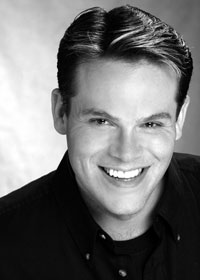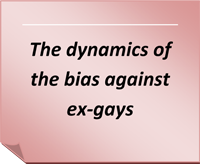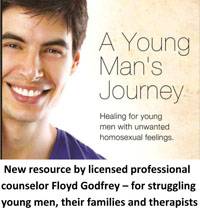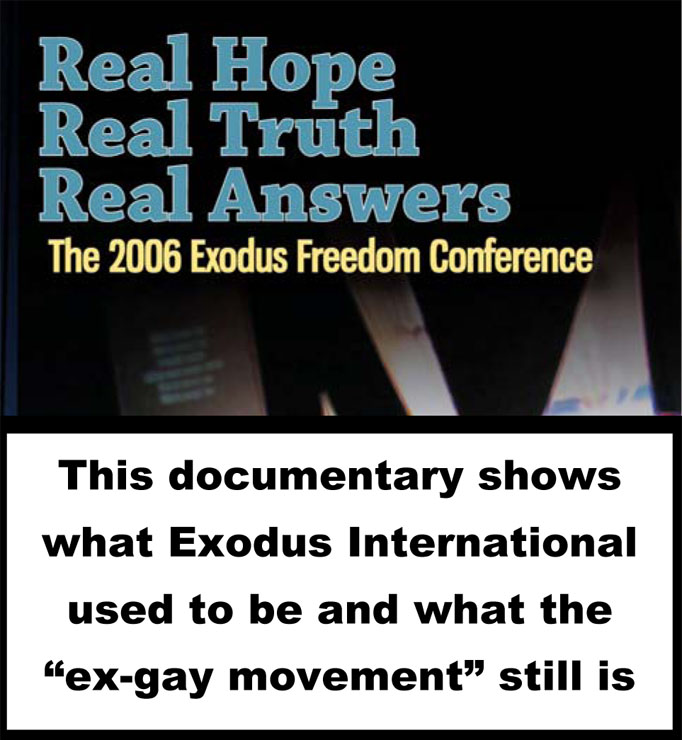Randy Thomas

Source:
Compiled by Thomas Coy from Randy’s “Life Story” on the Exodus International website accessed in February of 2010, Randy’s testimony from the “Tell the Truth” project of Love in Action, and from Randy’s address at the 2006 Exodus Freedom Conference.
Born:
Family Status:
Single
General Information as of 2010:
Randy Thomas personal website
Randy Thomas is a former Executive Vice President of Exodus International. Before coming to Exodus in 2002, Randy was the Executive Director of Living Hope — an Exodus ministry in Dallas, Texas. Randy provided strategic vision and direction while managing the day-to-day details of the organization for seven years. While there, he also created the first online youth outreach initiative that offers an alternative message about homosexuality to youth grappling with their sexuality. Randy travels extensively speaking on the topic of sexuality and gender, is an accomplished writer, and a recreational artist.
Randy has been interviewed by numerous media outlets across North America and Europe including ABC’s 20/20, the nationally syndicated Janet Parshalls’ America, and he is regularly interviewed for news features on Focus on the Family’s Family News in Focus. His story was the subject of an award-winning article in The Dallas Morning News and is featured in the book, The Good Life, written by bestselling author and former Watergate figure, Chuck Colson.
Personal Testimony:
Randy Thomas grew up in an abusive environment. At the age of 5 he perceived his natural father was a threat to his mother and at that young age promised his mother he would take care of her. Randy recalled that childhood, “Growing up I internalized the abuse and the pain grew. My need for love was desperate. I knew at a very young age that I preferred the company of males even though I wasn’t like them. When a male would smile my heart would leap. This became erotic at the age of ten.”
The pain in Randy’s heart continued through adolescence and at age 16 he started drinking and had his first homosexual experience. At eighteen he was dating men and frequenting gay bars. Randy believed the only thing going for him was his homosexual identity. He explained, “When I walked into my first gay nightclub, I was ecstatic. People here were friendly and fun and just like me! … My first sense of belonging, safety and identity was through the gay community.”
At nineteen Randy’s mother asked him if he was gay and he told her he was. His mother was not a religious person and as a family they had only briefly attended church, but in her childhood she had been taken to a rural Tennessee church and told that God hated fags. Randy’s mother imparted that theology lesson to her son and she threw him out of their home. A popular drag queen gave Randy a place to live.
Randy was openly gay and believed with his whole heart that he was born that way. He never thought about leaving homosexuality, because he believed he could only be happy as a homosexual. Every opportunity Randy had he promoted the gay ideology.
At that time he believed in a God, but didn’t really know what to think about Him. He had come to the conclusion that the Bible was culturally biased. When his mother kicked him out of their home he “became hard about hearing anything about the gospel.” Randy did not care about Christians. Despite his harden attitude at the age of twenty Randy went to a Bible study a co-worker invited him to and met a man who told him that “he wasn’t gay anymore and was getting married, to a woman.” Randy did not take it personally, but later he started to recognize that his life was empty and he began to fear the future. For the first time in his life he prayed an honest prayer – “God help me, please.”
One month later Randy was on a Greyhound bus headed for Dallas with a chance to “start over.” Instead he “found the best gay bars and drugs Dallas had to offer.” The night of New Years 1990 he was drunk and vomiting when he had a premonition of his own death in an alcoholic state of stupor. For Randy the event was a culmination of a lifetime of asking why. “Why all this pain? Why was I even still alive? I had been through drug overdoses, abuse (from childhood and gay bashers), worry-free homosexual sex. Nobody seemed to really care, so what’s the point?” Almost two months later Randy was in a twelve step program and sober for the first time in while. He thought he was at the beginning of a fulfilled gay life.
Randy’s life continued on a roller coaster. He had a spiritual experience where he felt the presence of God and he knew that “God had gotten me off drugs! He had orchestrated every move. He had a purpose for my life.” A short time later he started drinking again. It wasn’t until March of 1992 that he went back into the twelve step program where he was reunited with a friend that had recently become a Christian.
“Then it started; she kept talking about Jesus. This was the girl that would convince me to run around till dawn doing stupid fun things. But here she was, calm, reflective and loving. I was amazed that Jesus had transformed her life. I asked her about homosexuality and [was] angry at her response. She said, “I now believe it is a sin, but God would not call it a sin if there wasn’t something better.” She informed me that a former lover of mine had recommitted his life to Christ (I had no idea he was a Christian) and was getting married to a woman. This reminded me of the man at that Bible study in Nashville.”
“I decided to look at God seriously. … I easily could see the innate sinfulness of man. I agreed with God that I was not perfect. I could not attain heaven or an abundant life here by just being a “good person.” Homosexuality aside I had committed sin and needed Jesus as my Savior. I asked Jesus into my heart in May of 1992.”
“I became a Christian in May of 1992 because Jesus made sense. I didn’t become a Christian to become straight. When I became a Christian I didn’t even like Christians.” “I felt love move into my heart. I was overwhelmed at the amount of His love for me. I did not understand homosexuality as defined by scripture, but I knew if God is the God of the Bible He would make Himself known to me and prove His word to be true.”
In July of 1992 Randy had another spiritual experience, a vision, where he saw Jesus watching him and a former lover embrace. “I watched Jesus grieve in my mind’s eye. He let me feel the grief he felt for both of us. He so longed for us to turn to Him. He knew that we didn’t understand Him and that grieved Him more. I had given Ron everything, my whole being. However, Jesus wanted to be Lord of my life and He was jealously grieved over my submission to homosexuality. Christ knew that Ron and I could not complete each other or be fulfilled through homosexuality, and it hurt Him. It hurt Him because He loved us.”
“He took the scripture I couldn’t stand the most, the one in Leviticus, “When one man lies with another man as with a woman, it is an abomination before the Lord,” he explained the two men are not the abomination but the act is the abomination. The reason why God hates the act is because it separates us from him. Homosexuality is a false way to meet a legitimate need and a form of mankind’s rebellion toward God. He also grieved because He knew Ron would die a year later because of complications due to AIDS.”
“When I experienced how much God knew me and loved me anyway, when I realized that he wasn’t some insensitive, hateful God, my heart changed. I knew that He would see me out of homosexuality.” In July of 1992 Randy found Living Hope Ministries and Living Hope Ministries found Randy. There he “met people who wore the face of Christ.” Randy “learned to relate to men and women the way Father intended. I have received love from men and women in the body of Christ that displaces homosexuality. Father is continually showing me how to “overcome” sin, not just homosexuality.”Randy became free of “the bondage of drugs and alcohol” and he left his homosexual identity at the cross. Randy described his new identity as “a son of God in Jesus Christ.”
The rest of this testimony was written by Randy in 2007. “It isn’t enough to know about Him; I fell in love with Him. Who can run away from the One Who, though He often does so in a still small voice, sings of His Love so amazingly? Others might, but I can’t. His Spirit has empowered me to persevere, which in turn has transformed my character and gives me hope. Trials still come, of course, but today I walk through those dark times holding the hand of an amazing God rather than fumbling around blind.”
“Over the past 15 years I’ve gone from a seriously liberal gay-identified man arguing with pro-lifers and mean Christians to a seriously conservative Christian-identified man attracted to women, supporting pro-life causes and contending with gay activists. I’ve also learned to steward my sexuality and not allow it to rule my life.”
“While I might make light of the changes in my life by boiling them down to a series of contrasting labels, this journey has been and is difficult.”
Factors of Homosexual Causation:
As a child in a family with an abusive father he had early psychological reasons not to identify with males, because he did not want to be his father. He rejected his father and yet he needed healthy male affirmation. That legitimate need did not get properly met. Randy recalled “at a very young age that I preferred the company of males even though I wasn’t like them. When a male would smile my heart would leap.” Because that legitimate need of same-sex bonding and affirmation was not met, when he went through puberty the need turned erotic. From the testimony that is one obvious factor of causation of Randy’s same-sex attractions.
Motivations to Change:
Randy’s motivation to change was mostly spiritual. Even though he did not like Christians and abhorred the Leviticus condemnation of homosexuality, “Jesus made sense.” The drugs and alcohol were not filling the void in his life that sought love and relationship. The “worry-free homosexual sex” did not fill the void either. Randy did have a loving homosexual relationship at one point, but the relationship was short lived. Through his experiences as a gay man the gay mystique has become a false illusion.
Randy saw firsthand the changes following Jesus had made in people he knew, both gay and straight. Randy openly poured out his heart to God and had several spiritual experiences where he believed he felt the presence of God. It made sense to Randy that his homosexuality was “a false way to meet a legitimate need and a form of mankind’s rebellion toward God.” Randy believed Jesus could best meet his legitimate need in a lasting way.
Process of Change:
Spiritual experiences continued to happen to Randy Thomas. As a new Christian he was leaving church and felt God’s spirit tell him “that man; that man is going to take you to a group.” In the parking lot the man, with his wife in the car, stopped by Randy and asked him if he would like to go to lunch with them. Randy told them that “the Lord said you’re taking me to a group.” Upon which the couple smiled and said “get in.”
The man in the car was the worship leader of Living Hope Ministries, and Exodus affiliate. At Living Hope Ministries “they would talk about different issues that would have an issue along with codependency” like “idolatry and sexuality.” For Randy talking about issues like emotional dependency and abandonment would reveal sources of his inner pain.
It was rough for Randy from the beginning of his journey out of homosexuality. As he describes it “In that first year it’s like I’ve done nothing right in my entire life, and I was tired and depressed, and I’m like this is not fun. I lost my identity as a gay man. I lost my gay friends. I didn’t have to do anything.” As soon as Randy’s gay friends heard that he had become a Christian they abandoned him. That hurt Randy. Randy’s gay dream was “to find that one monogamous male partner” and live a happy content life. That dream went away and that hurt also. But Randy was changing. Instead of being in a gay bar on some illicit drug on Friday nights, he was in a Bible study.
Looking back Randy affirms “the investment is worth it. Trust me. But the journey out of homosexuality sometimes gets overpowered by over focusing on the issues. We focus on the issue after issue after issue, and the reality is that we overcome for the joy of knowing God and being known by Him. We look at these independent issues, because they keep us from knowing and being known. It’s the joy of the Lord that is our strength; not the uncovering of some new issue. It’s his joy that will carry you through.”
Copyright 2010




